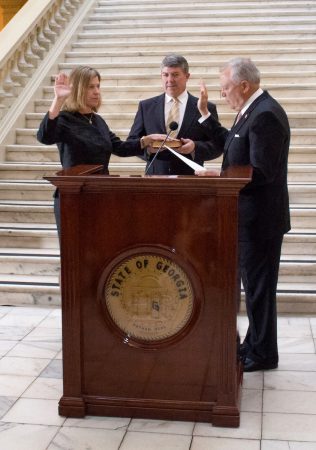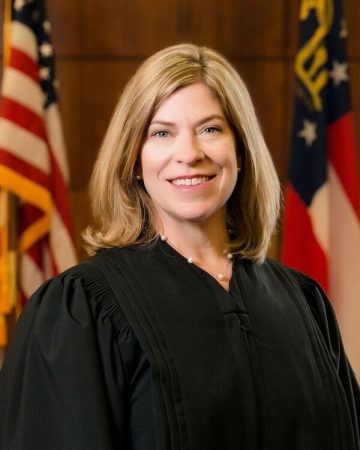Professional Judgement: Ashley Wright ’89 follows passion for justice as superior court judge

Ashley Wright ’89 was sworn in as a superior court judge for Augusta (Georgia) Judicial Circuit Court in January.
For about 20 years, Ashley Wright ’89 spent most of her time facing the judge’s bench as part of her role as assistant district attorney and then district attorney for Augusta, Georgia. These days, however, she has a different view of the courtroom—now from the bench.
Wright was appointed as a superior court judge for the Augusta Judicial Circuit Court in January and primarily handles divorce, support, custody, and other domestic cases. The new role was a natural step for Wright, who became district attorney in 2008 and oversaw cases involving crimes against children, sexual assaults, and violent felonies.
“During those years, I felt a strong sense of duty to protect the vulnerable, my community as a whole, and the judicial process,” Wright said. “Prosecution is so often reactionary. Hopefully, transitioning from being an advocate to a neutral will allow me some opportunity to be proactive in approaching and resolving community problems.”
While Wright is transitioning into the new role, Georgia’s courts system is going through some changes of its own. The state is working to improve court accessibility and has recently allowed citizens to appear in court pro se—on their own behalf and without an attorney—helping them save money on attorney fees.
“Understandably, many do not have a strong grasp of legal issues or procedure,” Wright said. “While I am not able to give advice to them, I try to help them sort out the case and hopefully resolve it in an expeditious manner.”
One of the biggest challenges of being a judge, Wright said, is the view into so many people’s lives and struggles. “Both as a DA and as a judge, I have seen the long-term challenges that so many families face, and it can be heart-breaking,” she said.

Judge Ashley Wright ’89
Though a career in the courtroom is the only one Wright can imagine now, there was a time when her life could have turned out completely differently. She was an English major, but credits her college experience for helping her learn to be adaptable and open to new opportunities and ideas.
“When I entered college, I really didn’t know what I wanted to do; and for that reason, a liberal arts education seemed like the best fit,” she said. “A liberal arts education is a frame of reference. Even in my specialized practice of prosecution, it helped to take a step back and look at the bigger picture of cause and effect, policy, emotional impact, and the appropriate legal and community response.”
Tags: alumnae, alumnae accomplishments, Ashley Wright '89, judge, magazine, outcomes, Vita Vol. 1 No. 2
